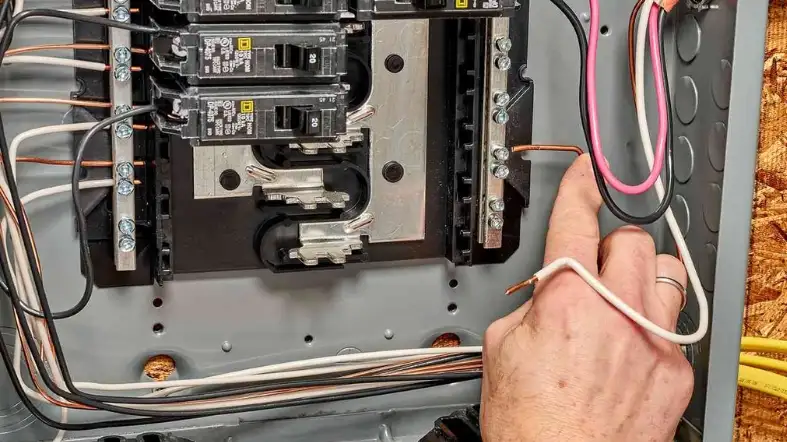Are you planning to install a 10-gauge wire and wondering what size breaker to use?
The breaker size needed depends on the amperage of the circuit.
In this article, we will provide you with a quick guide on what size breaker to use for 10-gauge wire. From the wire’s ampacity to the circuit’s load, we’ll cover everything you need to know to make an informed decision. So, let’s get started!

What Size Breaker for 10 Gauge Wire?
A 10-gauge wire can handle up to 30 amps, so it is recommended to use a 30-amp breaker with this wire size. 40-amp or 50-amp breakers can also be used depending on the length of the run and the load requirements.
Breaker Size Chart for 10 Gauge Wire:
| Wire Gauge | Breaker Size (amps) |
|---|---|
| 14 | 15 |
| 12 | 20 |
| 10 | 30 |
| 8 | 40 |
| 6 | 50 |
Types of Circuit Breakers Suitable for 10-Gauge Wire
There are several types of circuit breakers that can be used with a 10 gauge wire.
These include:
Standard Circuit Breakers
These are the most common type of circuit breakers and are used to protect against overcurrents caused by overloads or short circuits.
- Advantages: Simple and cost-effective.
- Disadvantages: Do not provide protection against ground faults or arc faults.
GFCI Breakers
Ground Fault Circuit Interrupter (GFCI) breakers are designed to protect against ground faults by quickly shutting off power when a ground fault is detected.
- Advantages: Provide protection against ground faults, which can cause electric shocks or fires.
- Disadvantages: More expensive than standard circuit breakers.
AFCI Breakers
Arc Fault Circuit Interrupter (AFCI) breakers are designed to protect against arc faults, which can cause fires by detecting and interrupting arcing conditions.
- Advantages: Provide protection against arc faults, which can cause fires.
- Disadvantages: More expensive than standard circuit breakers.
Dual Function (AFCI/GFCI) Breakers
These breakers combine the functionality of both AFCI and GFCI breakers, providing protection against both ground faults and arc faults.
- Advantages: Provide protection against both ground faults and arc faults.
- Disadvantages: More expensive than standard circuit breakers.
How to Determine the Right Breaker Size for 10-Gauge Wire

Determining the right breaker size for a 10-gauge wire involves several steps.
Here’s a step-by-step guide to help you through the process:
Conduct a Load Calculation
The first step in determining the right breaker size for a 10-gauge wire is to conduct a load calculation.
This will help you determine the maximum current that will flow through the wire.
You can do this by adding up the total wattage of all the devices that will be connected to the circuit and dividing it by the voltage of the circuit.
Check the Wire’s Temperature Rating
The next step is to check the temperature rating of the wire. Different wires have different temperature ratings, and this can affect their performance.
Make sure that the wire you’re using is rated for the temperature conditions in your area.
Consult Local Electrical Codes
It’s important to consult your local electrical codes to see if there are any specific guidelines for breaker size selection.
These codes may vary depending on your location, so make sure to check with your local authorities.
Choose the Right Breaker Size
Once you’ve conducted a load calculation, checked the wire’s temperature rating, and consulted your local electrical codes, you can choose the right breaker size for your 10-gauge wire.
A 10-gauge wire can handle up to 30 amps, so it is recommended to use a 30 amp breaker with this wire size.
However, other factors such as the type of load, environmental conditions, and local electrical codes may also influence the breaker size selection.
Factors Influencing Breaker Size Selection for 10-Gauge Wire
Several factors can influence the breaker size selection for a 10-gauge wire.
These include:
Type of Load
The type of load (continuous or non-continuous) can affect the breaker size selection. Continuous loads require a larger breaker size to handle the constant current flow.
Environmental Factors
Environmental factors such as humidity and temperature can affect the performance of the wire and may require a larger breaker size to ensure safe operation.
Wire Length
The length of the wire can affect its performance, with longer wires requiring larger breaker sizes to compensate for voltage drop.
Electrical Code Guidelines
Local electrical codes may have specific guidelines for breaker size selection that must be followed.
Safety Precautions
Safety precautions such as using a larger breaker size to provide an additional margin of safety may also influence breaker size selection.
Material and Construction of the Wire
The material and construction of the wire can affect its performance and may require a larger breaker size to ensure safe operation.
Electrical Device or Appliance Specifications
The specifications of the electrical device or appliance being connected to the circuit may also influence breaker size selection.
Cost Considerations
Cost considerations may also play a role in breaker size selection,
with larger breakers being more expensive.
NEC Guidelines for Breaker Size and 10-Gauge Wire

The National Electrical Code (NEC) provides guidelines for selecting the appropriate breaker size for different wire gauges, including 10-gauge wire.
According to the NEC, the breaker size for a 10-gauge wire should be based on the ampacity of the wire, which is determined by its temperature rating and the type of insulation used.
For a 10-gauge copper wire with 60°C insulation, the NEC recommends a maximum breaker size of 30 amps. For a 10-gauge copper wire with 75°C insulation, the recommended maximum breaker size is 35 amps.
And for a 10-gauge copper wire with 90°C insulation, the recommended maximum breaker size is 40 amps.
It’s important to note that these are general guidelines and other factors such as the type of load, environmental conditions, and local electrical codes may also influence the breaker size selection.
Always consult with a licensed electrician and follow your local electrical codes when selecting a breaker size for a 10-gauge wire.
FAQs About Breaker Sizing for 10-Gauge Wire
Is there a standard breaker size for 10-gauge wire?
Yes, a standard breaker size for a 10-gauge wire is typically a 30 amp breaker^1.
Are AFCI/GFCI breakers necessary for 10-gauge wire?
It depends on the application and local electrical codes.
AFCI/GFCI breakers provide additional protection against ground faults and arc faults but may not be required in all situations.
Can the same breaker be used for different wire gauges?
No, different wire gauges have different current-carrying capacities and require different breaker sizes to ensure safe operation.
How does wire length affect breaker size?
Longer wires can experience voltage drop, which can affect their performance.
A larger breaker size may be required to compensate for this voltage drop.
What is the role of electrical codes in breaker sizing?
Local electrical codes may have specific guidelines for breaker size selection that must be followed to ensure safe and compliant electrical installations.
Conclusion
Choosing the right breaker size for a 10-gauge wire is crucial for both safety and efficiency.
A 30 amp breaker is typically recommended for a 10-gauge wire, but other factors such as the type of load, environmental conditions, and local electrical codes may also influence breaker size selection.
Remember to always consult with a licensed electrician if you have any questions or concerns.

